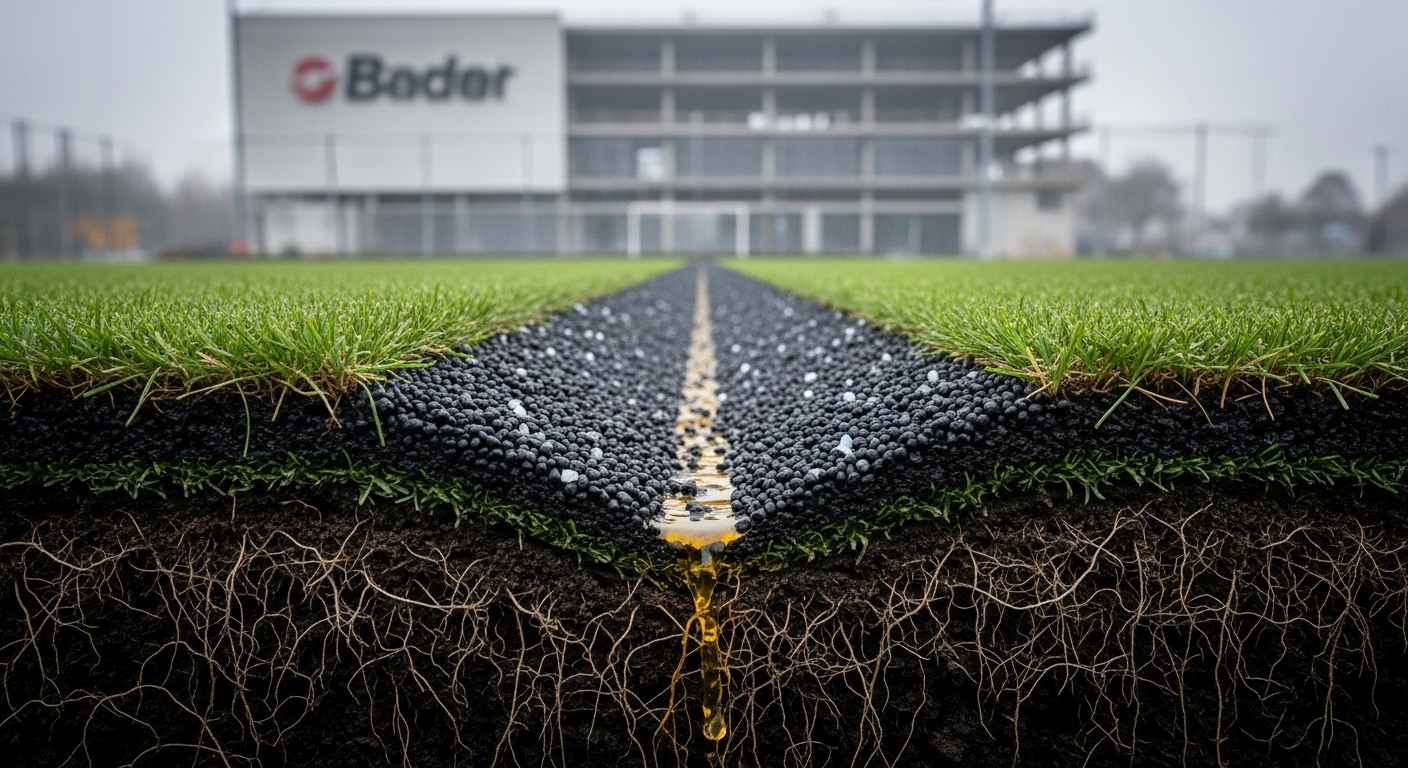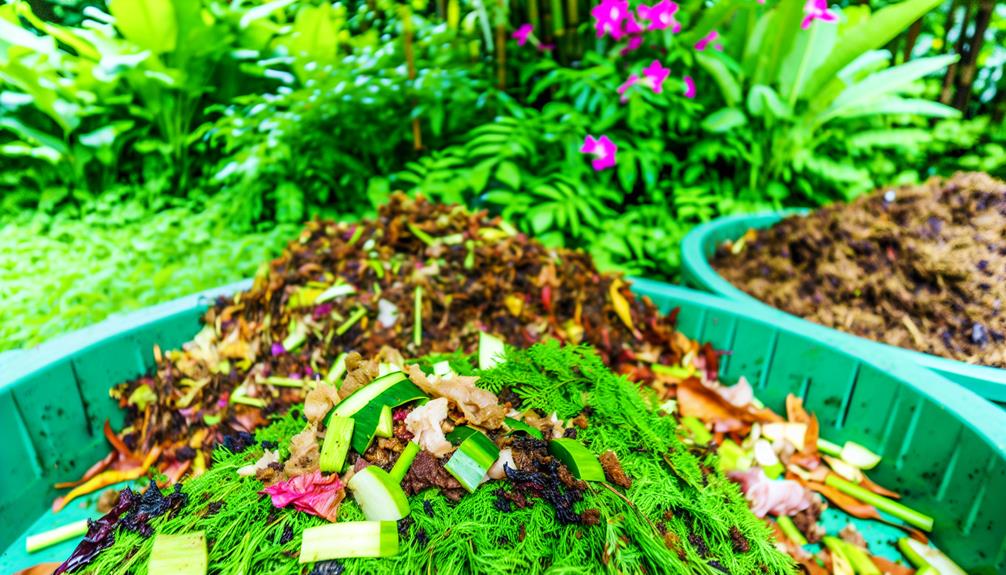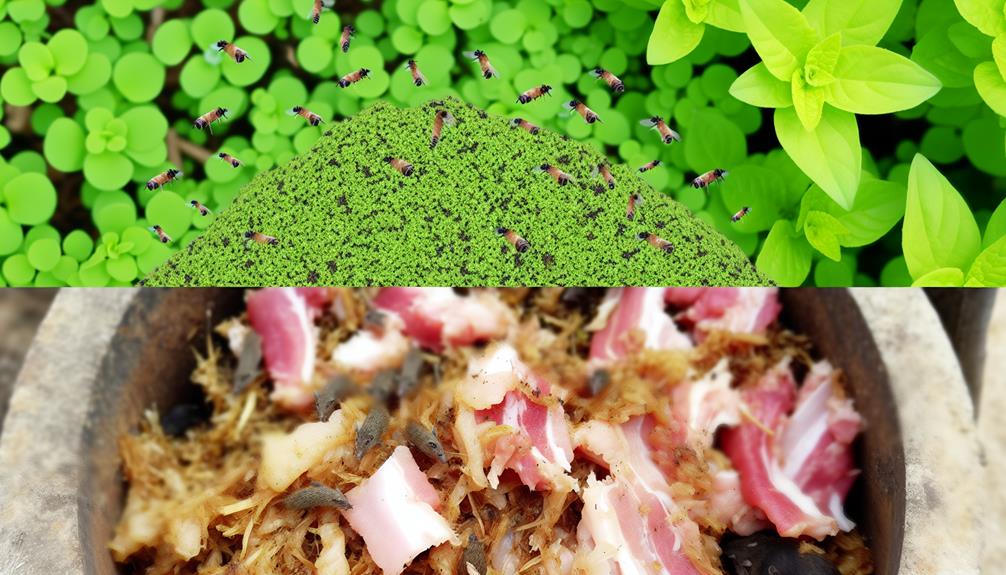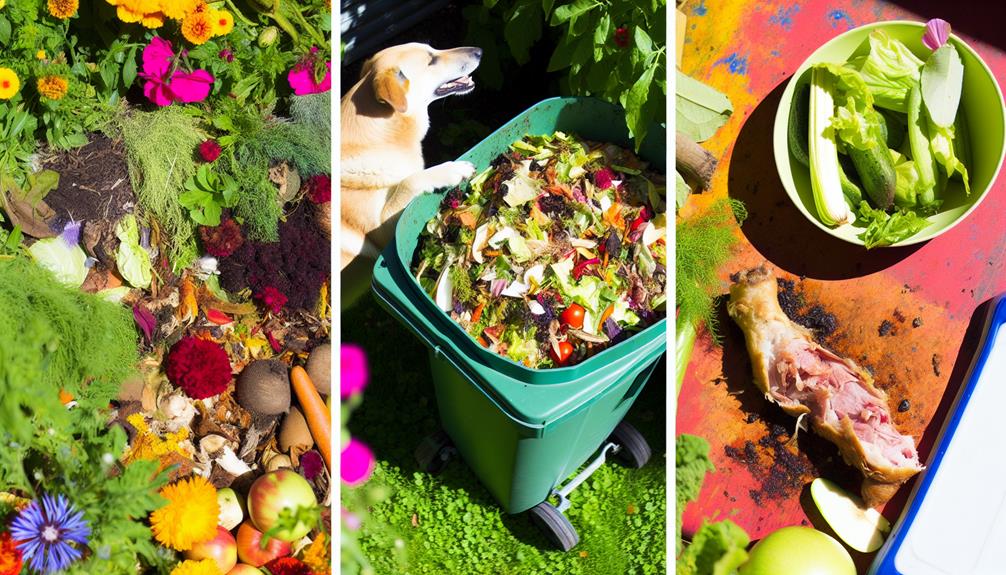

You can compost pork, but it demands careful handling. Pork decomposes through bacterial activity and needs high temperatures (140-160°F) for efficient breakdown. To avoid health risks and odors, chop the pork into smaller pieces and layer it with high-carbon materials. Turning the compost pile regularly helps maintain the necessary heat and aeration.
Be cautious, as pork can attract pests and harbor pathogens. An alternative method like vermiculture can be effective if properly balanced with vegetable waste and bedding. Start incorporating these steps, and you’ll enhance your composting practices greatly. Curious about the finer details?
Understanding the science behind composting pork involves recognizing the unique biological and chemical processes at play. When you compost pork, you’re dealing with meat decomposition, which is different from vegetable or fruit waste. Pork breaks down through bacterial activity, and these microorganisms are vital for efficient composting.
First, it’s essential to mention that meat, including pork, has a high protein and fat content. This can attract different types of bacteria and microorganisms compared to plant-based compost materials. As pork decomposes, bacteria such as Bacillus and Clostridium start breaking down the proteins and fats. This bacterial activity generates heat, which helps accelerate the decomposition process and kills off harmful pathogens.
To successfully compost pork, you need to make sure that your compost pile reaches a high temperature, ideally between 140-160°F. This temperature range is ideal for bacterial activity, ensuring that the pork decomposes efficiently and safely. Adding carbon-rich materials like straw or leaves can help balance the nitrogen-rich pork and maintain the necessary heat.
Composting pork offers several benefits, including reducing waste and creating nutrient-rich compost for your garden. When you compost pork, you’re not just diverting waste from landfills but also transforming it into valuable organic material. This practice plays a crucial role in waste reduction, which is important for a more sustainable environment.
Incorporating pork into your compost pile enhances the nutrient enrichment of the final product. Pork contains proteins and fats that break down into essential nutrients like nitrogen, phosphorus, and potassium. These nutrients are essential for healthy plant growth. By composting pork, you’re creating a more balanced and nutrient-dense compost that can improve soil structure and fertility.
You’ll also find that composting pork helps in building a more resilient garden ecosystem. The rich compost you produce can boost the microbial activity in the soil, promoting healthier plant roots and stronger plants. This means fewer chemical fertilizers, leading to a more natural, organic gardening approach.
Also Read: Can You Compost Rust?
While composting pork offers numerous benefits, it’s important to be mindful of the risks and challenges involved. One major concern is the potential health risks. Pork can harbor harmful pathogens like Salmonella, E. coli, and parasites, which can survive if the compost doesn’t reach high enough temperatures. This could pose serious health risks to you and others who handle the compost.

Contamination concerns are another challenge. If pork scraps aren’t composted properly, they can attract pests such as rodents and insects, which can spread disease. These pests can compromise the quality of your compost and make it unsafe to use in your garden. Additionally, improperly composted pork can produce unpleasant odors, making your composting area less enjoyable and potentially causing issues with neighbors.
To mitigate these risks, you must make sure that your compost pile maintains a high temperature consistently. This helps to kill off harmful pathogens and minimizes contamination concerns.
Additionally, keeping a balanced mix of green and brown materials can help manage odors and deter pests. Always remember to monitor your compost pile regularly and adjust as needed to maintain its health and efficacy.
To effectively compost pork, make sure your compost pile consistently reaches high temperatures. High temperatures, around 140-160°F (60-71°C), are essential for breaking down the pork and eliminating harmful pathogens.
Utilizing the right composting methods will help you achieve these temperatures and enhance the decomposition rate. Start by chopping the pork into smaller pieces to speed up its decomposition. Smaller pieces decompose more quickly and uniformly, ensuring that your compost pile stays balanced.
Next, layer the pork with high-carbon materials such as leaves, straw, or paper. This carbon-to-nitrogen ratio is vital for maintaining the right conditions for decomposition.
Lastly, turn your compost pile regularly to aerate it. Aeration helps maintain high temperatures and speeds up the breakdown process.
Best Practices for Composting Pork:
Also Read: Can You Compost Cat Manure?
If composting pork isn’t feasible for you, there are several other sustainable ways to manage pork waste.

One effective method is vermiculture, or worm composting. Unlike traditional composting, vermiculture relies on worms to break down organic material. However, keep in mind that pork should be added in moderation to avoid attracting pests or creating odors.
Balance is key; mix pork scraps with plenty of vegetable waste and bedding material like shredded paper to maintain a healthy worm bin.
Another option is anaerobic digestion, a process that involves breaking down organic material in an oxygen-free environment. This method produces biogas, which can be used as a renewable energy source, and digestate, a nutrient-rich substance that can be used as fertilizer.
To make use of anaerobic digestion, you might need to connect with a local facility that specializes in this process, as home setups can be complex and costly.
Yes, composted pork can attract pests to your garden. You can prevent this by ensuring proper storage and pest control measures. Keep your compost contained and sealed to foster a sense of community and protect your garden.
Pork decomposition speed in compost varies, typically taking several months. By managing your compost correctly, you’ll minimize the environmental impact and join a community of eco-conscious gardeners. Patience and care guarantee successful, sustainable composting.
You can compost pork bones along with the meat, but it’s challenging. The decomposition process for bones is slow. However, they add valuable nutrient content to your compost, helping your garden thrive and grow stronger together.
When composting pork, you might notice a strong odor. Effective odor management involves proper compost layering with browns and greens to help. By doing this, you’ll create a community-friendly compost system that everyone appreciates.
Yes, composted pork can provide nutrient benefits, but you’ve got to take into account plant suitability. Some plants thrive on it, while others might not. Join our community and share your experiences for better gardening success!
To sum up, you can compost pork if you follow best practices to mitigate risks. Use a hot composting method to guarantee harmful pathogens are destroyed.
Avoid adding large quantities at once, and balance with plenty of browns and greens. Consider using a composting bin with a secure lid to deter pests.
If you’re unsure or uncomfortable, explore alternatives like bokashi composting or using a municipal composting service. Always prioritize safety and environmental responsibility in your composting efforts.
